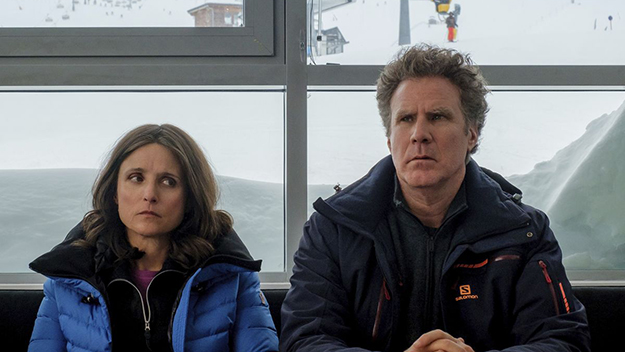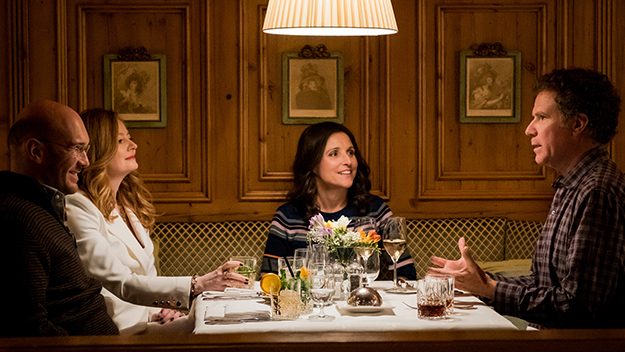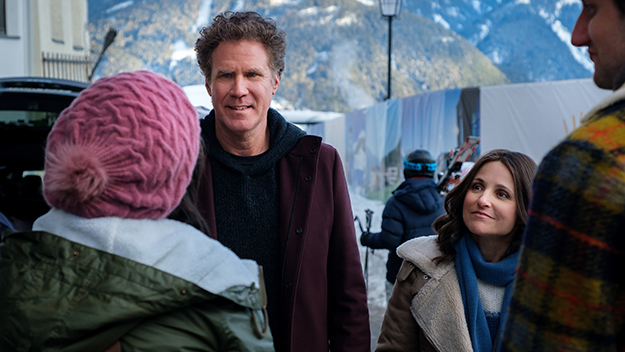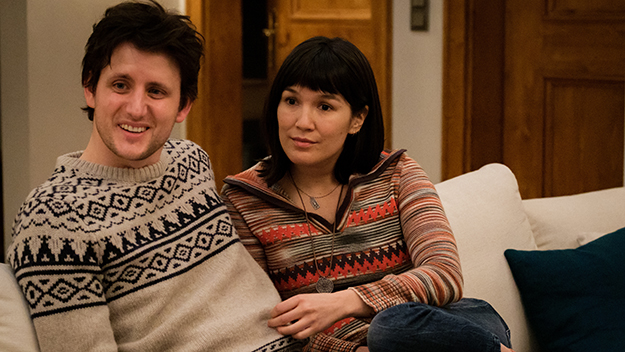Downhill (Jim Rash and Nat Faxon, 2020) Julia Louis-Dreyfus has an ideal toolkit for comedy-drama, including slow and fast burns, crossed tripwire reflexes, and tunnel-vision with a light at the end of the tunnel. As a producer-star she gives herself a chance to showcase all of them in Downhill, the erratically enjoyable Americanization of Ruben Östlund’s Swedish hit, Force Majeure (2014). Playing a wife and mother who sees her husband (Will Ferrell) choose to save himself rather than protect his family during a moment of terror at an Alpine ski resort, Louis-Dreyfus captures the woman’s incredulity, then italicizes it into anger, grief, and a peculiar kind of taut, bleak humor. No exaggeration is allowed. She’s shaken; we’re stirred. Her laser focus and intensity, and the play of intelligence in her face, make Billie’s emotions refreshingly stringent even when they’re cuttingly funny. Writer-directors Jim Rash and Nat Faxon (The Way Way Back, 2013) and a third writer, Jesse Armstrong, orchestrate the emotional beats to suit their performers. This film is equally about a man reeling from his failure to act as a traditional male guardian, and a couple handling a trauma while each endures a mid-life crisis. In the original, the model-like wife makes oblique, rueful comments about age and the responsibilities of motherhood. But they seem merely poignant and wistful emanating from then 34-year old Lisa Loven Kongsli. Here they resonate like the thump of a snow cannon. Louis-Dreyfus was 58 while shooting Downhill; the adaptation benefits from its respect for the potency of experience. It gives Louis-Dreyfus’s fed-up heroine a streak of sexual resilience and a suitable profession as a powerhouse lawyer. (This script also ages the kids from tykes to adolescents.) The moviemakers streamline Östlund’s narrative—this version is half an hour shorter. At the same time, they almost too neatly balance the blustery defensiveness of Ferrell’s Pete Stanton with the burgeoning strength of Louis-Dreyfus’s Billie.
The film introduces them and Finn (Julian Grey) and Emerson (Ammon Ford), their fraternal twin sons, as a resort photographer tries to shoot them in the snow. Even at the start, they’re too off-kilter for a happy-family pose. We soon learn that Pete has emotionally checked out since the death of his father eight months before. He and Billie say the trip is for everyone, but it has turned out to be primarily for him. Rather than reserve a room in the child-centered compound down the road, he’s booked a hotel geared for couples and for singles on the prowl. And not just singles: Miranda Otto’s elusive Charlotte, who presents herself as a hotel greeter but never actually works, treats her winters in the mountains as sexual sprees and her summers on a farm as married downtime. We learn how deeply Pete has entered me-mode when a controlled avalanche cascades out of control: it whites out visibility and blasts powder on everything and everyone on a restaurant terrace. While Billie shields her boys with her own body, Pete skedaddles with his cell phone, only to return seconds later, the threat gone. Seemingly oblivious, he sits down and orders soup. This crisis started with the sound of an avalanche cannon (designed to blast excess snow toward empty rather than active slopes), and it climaxes with Billie and the kids looking shell-shocked. In the ensuing scenes of exemplary cringe comedy, Pete struggles to avoid discussion, downplays the scariness of the near catastrophe, and argues that he experienced a different subjective truth than his shaken wife. Billie doesn’t buy any of it—and a terrible beauty is born. Ferrell’s performance suffers from Pete’s constricted range, his descent into teary self-pity, and the adoption of “Every day is all we have” as his mantra. Still, Ferrell is a wonderful foil for Louis-Dreyfus as well as a master of self-delusion. He’s terrific when Pete vainly tries to corral Billie and the boys into a chopper for a day of heli-skiing and lets them know it was Daddy’s idea to set up this expensive good time. The stunned anguish in his eyes and the sound of his pathetic wheedling combine for a moment that’s perfectly funny-sad.
Rash and Faxon generally avoid the abstract, eerie modernism of Östlund’s visual approach, which repeatedly contrasts intimate angst with the clean contemporary lines of the family’s French Alps hotel, and the hypnotic patterns embedded in the running of the resort. The American directors turn away from the deadpan cool of Östlund’s dramaturgy, which makes even lengthy scenes play like blackout sketches. Force Majeure may be a far more individualistic and accomplished movie than Downhill, but it’s also a fluky sort of achievement that could never be replicated. Its cinematic rigor covers holes in the plot and characters and camouflages predictable attitudes, like the use of a hotel caretaker as a sardonic observer. Rash and Faxon set Downhill in a semi-gemütlich corner of the Austrian Alps and Danny Cohen (A Very English Scandal, The King’s Speech), shoots it in warmer tones, with more fluid moves. This film tends to be weakest when it’s most conceptual—say, when Pete and Billie go from sharing a sink to using separate ones on opposite sides of a wall, and then stare in their mirrors. (We get what’s happening nearly before it happens.) What’s worse, in attempting to square away motivations Östlund left obscure, they lose their comic-dramatic spark, especially when Billie explains how and why she’s teaching Pete a lesson. These filmmakers do best when they set up gags and confrontations in classic sitcom style and enable performers to go all-out with them. That includes Otto in her exuberant low parody of erotic selfishness and aggression and Zach Woods and Zoë Chao as Pete’s real-estate office friend Zach and his new 30-year-old girlfriend Rosie. Pete invites Zach and Rosie for dinner just when Billie wants desperately to talk about the avalanche. She sees through Pete’s evasive ploy and determines to speak truth to weakness anyway. Woods’s squiggly physicality visualizes Zach’s squirminess as he tries to cushion Pete’s pain—an apt counterpoint to Chao’s witty portrayal of Rosie’s staccato certainty about the world, including her “expansion” of Zach’s life.
The equivalent scene was also a high point of Force Majeure, mostly because of burly, bearded Kristofer Hivju’s sneaky-droll tour de force as the anti-hero’s workplace friend. In a guest appearance in Downhill as the resort’s gruff safety officer, Hivju energizes another peak scene: the fiercely litigious Billie contends that he neglected to post avalanche warnings. Ferrell acts with superb nice-guy embarrassment as Hivju bluntly declares they were posted everywhere and tells Billie, “We’re not in America where you sue because your coffee is hot.” Remaking an arthouse favorite in her own image, Louis-Dreyfus passes an artistic test. I hope she and Ferrell also pass this test of their drawing-power. For all its faults, Downhill is a gutsy little “serious farce.” We’ve got to admire the chutzpah of a Valentine Day’s opening that boldly proclaims, “Love means having to say you’re sorry.” Michael Sragow is a contributing editor to Film Comment and writes its Deep Focus column. He is a member of the National Society of Film Critics and the Los Angeles Film Critics Association.



